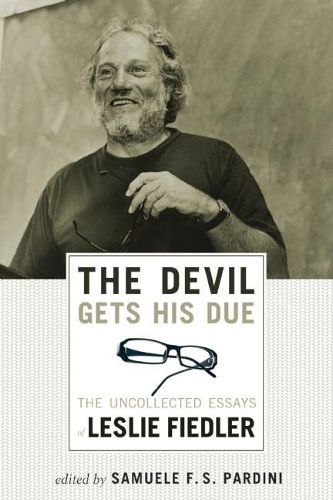Readings Newsletter
Become a Readings Member to make your shopping experience even easier.
Sign in or sign up for free!
You’re not far away from qualifying for FREE standard shipping within Australia
You’ve qualified for FREE standard shipping within Australia
The cart is loading…






Despite his often-unacknowledged influence, academics, intellectuals, and the general audience in America and abroad still read Leslie Fiedler’s work and draw on its concepts. He inspired both reverence (Leonard Cohen penned: leaning over the American moonlight / like the shyest gargoyle / who will not become angry or old ) and rage (Saul Bellow called him the worst fucking thing that ever happened to American literature ). The essays in The Devil Gets His Due will reacquaint readers with the depth and breadth of Fiedler’s achievements. Tackling subjects ranging wildly from Dante, Ezra Pound, and Mary McCarthy to Rambo, Iwo Jima, and Jerry Lewis, these writings showcase Fiedler’s pioneering of an egalitarian canon that encompassed both high and popular literature, cinema, and history. As such, they show a powerful mind critiquing whole aspects of a culture and uncovering lessons therein that remain timely today. A lengthy introduction by Professor Samuele F. S. Pardini offers both context and history, with an in-depth profile of Fiedler and his career as both a literary critic and a public intellectual.
$9.00 standard shipping within Australia
FREE standard shipping within Australia for orders over $100.00
Express & International shipping calculated at checkout
Despite his often-unacknowledged influence, academics, intellectuals, and the general audience in America and abroad still read Leslie Fiedler’s work and draw on its concepts. He inspired both reverence (Leonard Cohen penned: leaning over the American moonlight / like the shyest gargoyle / who will not become angry or old ) and rage (Saul Bellow called him the worst fucking thing that ever happened to American literature ). The essays in The Devil Gets His Due will reacquaint readers with the depth and breadth of Fiedler’s achievements. Tackling subjects ranging wildly from Dante, Ezra Pound, and Mary McCarthy to Rambo, Iwo Jima, and Jerry Lewis, these writings showcase Fiedler’s pioneering of an egalitarian canon that encompassed both high and popular literature, cinema, and history. As such, they show a powerful mind critiquing whole aspects of a culture and uncovering lessons therein that remain timely today. A lengthy introduction by Professor Samuele F. S. Pardini offers both context and history, with an in-depth profile of Fiedler and his career as both a literary critic and a public intellectual.